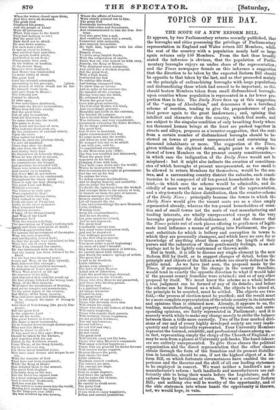TOPICS OF THE DAY.
THE SCOPE OF A NEW RFFORM
Ir appears, by two Parliamentary returns recently published, that the boroughs and cities possessing the privilege of Parliamentary representation in England and Wales return 337 Members, while the rest of the country with a population nearly half as large again returns only 159 Members. From the fact thus broadly stated the inference is obvious, that the population of Parlia. mentary boroughs enjoys an undue share of the representation ; and the Times newspaper founds on this inference a suggestion that the direction to be taken by the expected Reform Bill should be opposite to that taken by the last, and as that proceeded mainly on the principle of enfranchising boroughs with large populations and disfranchising those which had ceased to be important, so this should bestow Members taken from small disfranchised boroughs upon counties whose population is represented in a far lower pro- portion than is fair. The Daily News fires up at this suggestion of the "organ of Absolutism," and denounces it as a barefaced scheme of reaction, tending to give the preponderance of poli- tical power again to the great landowners ; and, opining that intellect and character shun the country, which God made, and are subject to the singular condition of only breathing freely where ten thousand human beings at the least are packed together in streets and alleys, proposes as ecounter-suggestion, that the seats from a certain number of disfranchised boroughs should be be- stowed on towns at present unrepresented and containing ten thousand inhabitants or more. The suggestion of the Times, given without the slightest detail, might point to a simple be- stowal of town Members on the present county constituencies,— in which case the indignation of the Daily News would not be misplaced : but it might also indicate the creation of constituen- cies of which boroughs at present -unrepresented, as too small to be allowed to return Members for themselves, would be the cen- tres, and a surrounding country district the suburbs, such consti- tuencies to be composed of all ten-pound householders in the dis- trict,—in which case the scheme would be admissible, and de- cidedly of more worth as an improvement of the representation, and a step towards the fairer distribution, than the counter-scheme of the Daily News ; principally because the towns to which the Daily News would give the vacant seats are as a class amply represented already, whereas the ten-pound householders of coun- ties and of small towns not the seats of vast manufacturing and trading interests, are wholly unrepresented except in the very boroughs proposed for disfranchisement. And the chance that the Times points out of such places offering to gentlemen of legiti- mate local influence a means of getting into Parliament, the pre- sent substitute for which is bribery and corruption in towns to which they are personally strangers, and which have no care for or knowledge of anything about them except the length of their purses and the induration of their gentlemanly feelings, is an ad- vantage not to be lightly contemned or thrown aside. But in truth, it is idle to discuss any single element in the new Reform Bill by itself, or to suggest changes of detail, before the principle and objects of the bill as a whole are clearly defined in the public mind. As we have just seen, the proposal made by the Times, if accompanied by the change in the county franchise, would tend in exactly the opposite direction to what it would take if the present county franchise were retained;' and so of any other proposal by itself. We must know the scheme as a whole before a true judgment can be formed of any of its details ; and before the scheme can be framed as a whole, the objects to be aimed at, the principle to be asserted, must be settled. The objects are two- fold,—the process of election must be purified; and the result must be a more complete representation of the whole country in its interests and opinions than is obtained now. Already, it appears to us, the trading, manufacturing, and property-owning interests, and corre- sponding opinions, are fairly represented in Parliament; and it is scarcely worth while to make any change merely to strike the balance between them a trifle more correctly. Two of the four marked divi- sions of our and of every highly developed society are very inade- quately and only indirectly represented. Four University Members represent the learned, scientific, and professional classes among us,— in fact, representing simply the clergy of the Church of England ; as may be seen from a glance at University poll-books. The hand-labour- ers are entirely unrepresented. To give these classes the political organization and the direct representation that the other classes obtain through the form of the franchise and its present distribu- tion in localities, should be one, if not the highest object of a Re- form Bill, on which fortunate circumstances have enabled the ex- perience and the theories and the skill of all our leading statesmen to be employed in concert. We want neither a landlord's nor a manufacturer's reform : both landlords and manufacturers are suf- ficiently able to bring their wants before the Legislature, and to enforce them by battalions of votes. We want a national Reform Bill; and nothing else will be worthy of the opportunity, and of the able statesmen into whose hands the opportunity is thrown, not, we would hope, in vain.


























 Previous page
Previous page